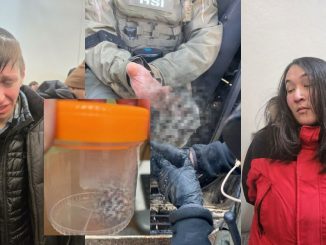
| Published June 30, 2025
In a stunning breach of national security and trust, reports reveal that Mexican cartel hackers, specifically linked to the notorious Sinaloa cartel, managed to infiltrate U.S. surveillance systems—using FBI tools and infrastructure against American interests. What unfolded next was not only a cyberespionage scandal, but a chilling example of how deeply organized crime can exploit vulnerabilities within federal systems, leading to the deaths of informants and raising new fears about America’s digital defenses.
An Inside Job—or Just Insecure Networks?
According to reports from The Gateway Pundit, Fox News, and the New York Post, a skilled cartel hacker allegedly gained control over a network of surveillance cameras in Mexico City. These were not just any cameras—they were part of a system used in cooperation with U.S. law enforcement, including the FBI and the DEA, to track cartel operations and safeguard informants and agents.
The hacker reportedly accessed these systems via the mobile phone of an FBI agent. Whether this was due to lax security, social engineering, or insider coordination remains under investigation. What is confirmed is that with access to this agent’s phone, the hacker could remotely view camera feeds, pinpoint locations of informants, and manipulate the very technology meant to protect them.
Blood on the Wires
As a result of this breach, at least one informant was hunted down and killed, officials say. The cartel’s use of this intelligence turned what should have been covert operations into deadly traps. The breach highlights the increasingly tech-savvy nature of organized crime groups in Mexico, which now include highly trained cyber operatives alongside traditional drug trafficking networks.
A Justice Department official described the incident as “deeply alarming,” and noted that cartel hackers are “evolving faster than anticipated.” Meanwhile, U.S. agencies are scrambling to audit digital tools used in joint operations and reassess communication security with Mexican authorities.

The hacking operation was led by Joaquín “El Chapo” Guzmán’s Sinaloa Cartel. It is unclear when it happened.Xinhua/Shutterstock
What This Means for U.S. National Security
This breach has serious implications. First, it raises questions about how the FBI protects its digital assets, including the personal devices of agents operating in sensitive environments. Second, it calls into question the reliability of partnerships with Mexican authorities—especially considering the cartels’ deep infiltration of law enforcement and political networks in Mexico.
Most disturbing, perhaps, is the message this sends to informants and whistleblowers who risk everything to provide intelligence to U.S. agencies. If they cannot be protected, future cooperation may dry up—weakening efforts to dismantle the cartels from the inside.
Digital Drug Wars: The New Frontier
This incident marks a new chapter in the ongoing war on drugs—one fought not just with guns and money, but with smartphones, surveillance cameras, and software exploits. The Sinaloa cartel, long known for its violence and influence, is proving it can also be a force in cyberspace.
Unless American intelligence and law enforcement agencies adapt rapidly, they may find themselves increasingly outmatched—not just on foreign soil, but in the very networks they designed to keep the public safe.
 Resulting Effects
Resulting Effects
1. Informants Targeted and Killed
The most immediate and tragic outcome was the assassination of at least one FBI informant in Mexico. By exploiting camera systems and data from an FBI agent’s compromised phone, the cartel was able to track informants in real time, leading to lethal consequences. This has shaken confidence in the safety protocols for witnesses and informants.
2. Erosion of Trust in U.S.–Mexico Intelligence Cooperation
The breach has further strained already fragile U.S.-Mexico law enforcement cooperation. Trust between agencies is eroding as U.S. officials now worry about compromised Mexican surveillance systems and possible cartel infiltration within Mexican authorities.
3. National Security and FBI Credibility Damaged
The FBI’s credibility has taken a hit, especially regarding digital security. If a cartel can breach the phone of an FBI agent and use surveillance systems to their advantage, it raises serious concerns about the Bureau’s cyber hygiene and internal controls.
4. Informant Recruitment at Risk
News of this breach may deter potential whistleblowers or cartel insiders from cooperating with the U.S. in the future. Fear of being tracked down and killed—even under FBI protection—could significantly hamper efforts to dismantle criminal networks.
5. Digital Countermeasures Under Review
Federal agencies are now urgently reviewing protocols around device usage, data sharing, and surveillance access. The Department of Justice is reportedly reevaluating its digital infrastructure and seeking ways to isolate sensitive surveillance tools from potential third-party manipulation.
6. Increased Cartel Cyber Warfare Capabilities
This incident confirms what experts have feared: cartels are not just violent but increasingly tech-savvy. Their ability to engage in cyberwarfare—using hacking skills to turn law enforcement systems against their enemies—marks a shift in the threat landscape.
7. Calls for Congressional Oversight and Reform
In Washington, the incident is prompting calls for congressional hearings on FBI cybersecurity practices and cross-border intelligence protocols. Lawmakers are demanding accountability and better safeguards for digital tools used in international operations.
 Bottom Line:
Bottom Line:
The breach of FBI-linked surveillance systems by a Sinaloa cartel hacker marks a sobering turning point in modern law enforcement and counter-cartel operations. It exposed critical vulnerabilities in U.S. digital security and demonstrated how organized crime is no longer confined to street-level violence—it now operates on a sophisticated, cyber-enabled front. The loss of informants, erosion of trust, and rise of cartel cyber capabilities reveal a new battlefield where intelligence and technology are both weapons and weak points.
To move forward, U.S. agencies must not only fortify their digital infrastructure but also rebuild the trust of their informants and partners. The safety of future operations—and the lives they aim to protect—depends on it.
SOURCES: THE GATEWAY PUNDIT – FBI Compromised by Cartel Hacker Who Gained Control of Cameras, Multiple Left Dead in Fallout
THE NEW YORK POST – Mexican cartel hackers used FBI agent’s phone and public cameras to track down and kill informants: report
FOX NEWS – Sinaloa cartel hacker turned Mexico City cameras against FBI, leading to killings, DOJ says





Be the first to comment